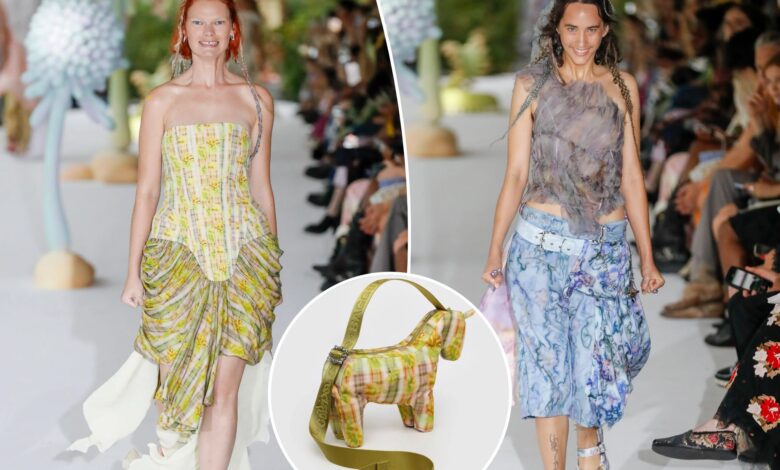Collina Strada’s Baggu collab under fire for AI-generated prints

Customers would prefer if designers stopped horsing around with AI.
New York-based fashion label Collina Strada is facing backlash online for enlisting artificial intelligence in the design process for its latest collection with BAGGU, which features a $70 horse-shaped bag that has since gone viral.
While both brands pride themselves on sustainability, consumers argue that the use of AI in the creation of particular prints for the collaboration — which launched earlier this week — goes against the companies’ eco-friendly missions.
“Honestly, I was really looking forward to this collection but after learning that the prints are AI-generated I’m not so excited anymore,” one Redditor wrote in an online forum.
The user claimed to have plugged the prints into an AI detection tool only to find that “most of the prints are AI-generated.”
“As a longtime BAGGU user, this is disappointing to say the least,” the user continued. “I was really hoping to buy one of the medium crescents in the blue thorn but after learning that it’s AI, I highly doubt it.”
According to the product listings on BAGGU’s site, only two prints — “Blue Thorns” and “Boxer Plaid” — were “AI-conceptualized,” or created with the help of the generative AI program Midjourney, in order to “remix old Collina prints” in order to “drive them further.”
“We originally developed these prints for our SS24 collection ‘Soft is Hard’ by inputting Collina prints from previous seasons and using the ‘blend’ feature to remix them together,” Collina Strada creative director Hillary Taymour told The Post in a statement.
“The output of this process provided the basis of new original print: we would take a flower or a star from one of the outputs, give it to our print team, and collage it with other elements from past Collina prints to create a new repeating pattern,” she continued, adding that “original, hand-drawn” brand logos were also added to the prints.
In a way, their use of artificial intelligence is a new-age take on what it means to recycle, especially at Collina Strada, which prides itself on sustainability.
“Remix and reuse are important pillars of the Collina Strada ethos, and we were curious to see how this new technology could evolve our techniques and aesthetics by allowing us to remix and ‘upcycle’ our own original prints in unique and innovative ways,” Taymour said.
Still, a chorus of angry customers chastised their once-beloved brand online, condemning Collina Strada and BAGGU for utilizing the new-age tech. Users in the comments of BAGGU’s launch announcement on Instagram argued that artificial intelligence negatively impacts the environment and artistic creatives.
“Can’t believe you guys used AI on this. Your community is full of artists and creative people and you chose AI? Seriously??” scolded one disappointed customer, adding that not only is AI “horrible for the environment” but it also “goes against all the marketing” of the brands.
“Using AI is unforgivable. Horrible for artists and even more importantly the environment,” commented another. “Hurts my heart but I will not be buying from Baggu anymore.”
“I did not know about the AI pattern,” wrote someone else. “Will be canceling my order.”
“Lowkey upset finding out that I paid $20 more for an AI generated print,” one user chimed in.
In her statement to The Post, Taymour acknowledged customers’ concerns regarding the use of AI.
“We at Collina Strada are deeply concerned about the potential environmental impact of AI technology. The aggregate impact of AI on the environment is still a hotly contested subject, and it is not yet clear how our own limited use of the tool contributes to the technology’s environmental impact,” she said.
“We continue to monitor the research and development in this area to make sure we stay in reasonable alignment with our ideals as a sustainably-minded brand.”
In a statement to Mashable, the label said that the use of Midjourney “does not take away the process of using print designers” and was only “used as an experiment for this season and translated by designers.”
On Instagram Stories, the label’s photographer and co-creative director, Charlie Engman, allegedly responded to some of the online backlash, according to a Redditor who captured screenshots of Engman’s posts. His seemingly flippant attitude towards consumer concerns, which users claimed were “predictable and reasonable pushback,” was criticized as “immature.”
The Post has contacted BAGGU for further comment.
Artificial intelligence, past reports have claimed, is an energy-suck.
By 2030, the energy consumption required by AI data centers is expected to surpass New York City’s annual electricity use seven times over, per CNBC. Such projections, industry experts say, could drive up demand for natural gas, as opposed to renewable energy.
Meanwhile, AI has struck fear in artists, some of whom have expressed concerns about their art being used to train software, a dilemma that has already spurred multiple lawsuits.
AI worries also prompted a 118-day strike in Hollywood and an open letter signed by the industry’s most prominent musicians who claimed the use of AI would “infringe upon and devalue the rights of human artists.”



